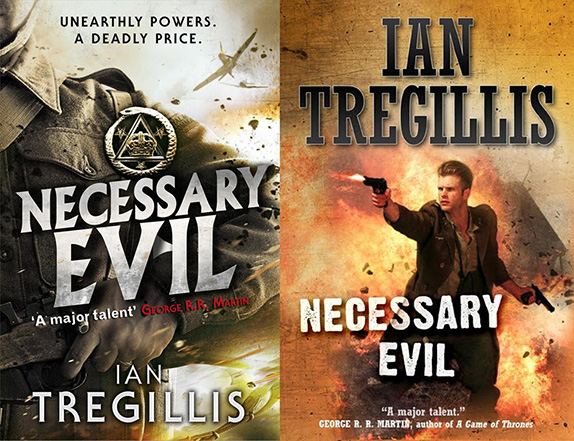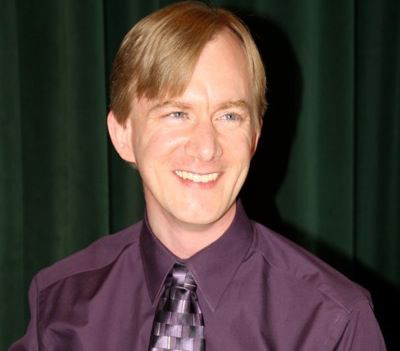
Ian Tregillis represents two sides of New Mexico’s collective brainpower: the sciences and the arts. By day, he works at Los Alamos National Laboratory. By night—and on weekends and days off—he writes sharp trope-busting fiction. The ink is still cooling on the final volume of his Milkweed Triptych, Necessary Evil.
In this series’ alternate take on the twentieth century, a Nazi scientist taps into the power of the human brain to create battery-powered Übermenschen, a.k.a. superheroes. In order to survive World War II, Britain turns to its secret warlocks, the supernatural source of whose magic demands to be paid in blood. After the ensuing war, a different kind of Cold War follows, with advanced Soviet superheroes lying in wait and newly-bred British warlocks sitting in the wings. However, for all their politics and tactics, the decades of strife have been orchestrated by a single woman: Gretel, the psychopathic seer who would gleefully destroy the world to ensure her own survival. British Intelligence officer Raybould Marsh must figure out how to outsmart the girl who knows everything. It’s the only way he can preserve the world he has dedicated his life to protecting.
Is the series science fiction, or is it fantasy? Ian blends the two genres as artfully as he does physics and creativity. Through the expanded parameters of these genres, the trilogy pokes and prods at the very human issues and choices that face us today. The writing is far smarter than the dust jacket would have you believe, and the entire series bolsters New Mexico’s literary cred.
I threw some questions at Ian before his West Coast signing tour, which lands him in Albuquerque on Saturday, May 11. (He’ll be holding a talk and signing copies at Alamosa Books from 3:00-5:00.) Here’s what he had to say:
ZH: So many New Mexican authors feature New Mexico in their stories. I’m therefore fascinated that you, a LANL physicist, would write a revision of World War II that removes the United States and its nuclear program from the war. You’ve wiped out the biggest reason for your own employer’s existence! Yet New Mexico is so very other that I imagine it has shaped you in some way. How has the state influenced and impacted your writing?
IT: It’s no coincidence that there’s no Manhattan Project in the altered history of the Milkweed books. I like to keep my writing life entirely separate from my daytime career. Sometimes that influences the work in strange ways. But, having said that, I seriously doubt I’d have a writing career right now if I hadn’t moved to New Mexico. I’d still be writing, but I wouldn’t be where I am today—I’ve been very fortunate to get much farther than I had anticipated, and much sooner. It was very much a case of being in the right place at the right time (or perhaps the right places at the right times).
When I moved here, I was following a job and not thinking about writing. But I soon started writing in order to give myself new goals—I had just finished graduate school, which had consumed years of my life, and felt the need to find something new to fill that void. All without knowing that New Mexico features such a high density of professional writers.
In 2005 I attended the Clarion Writers’ Workshop, which is an intense six-week residential workshop for aspiring genre writers. (I was very lucky that my research group at LANL let me take over a month of leave!) One of my instructors at the workshop was Walter Jon Williams, who has lived in New Mexico for many years. He invited me to join his local writing group after the workshop came to a close. It’s there that I came to know many of the luminaries in the New Mexico writing community. It’s also how I met my literary agent. And, of course, working alongside so many brilliant writers has greatly improved my own writing.
It’s no exaggeration when I tell people that moving to New Mexico changed my life, personally and professionally.
ZH: The way I read the Milkweed books, their external conflict centers around the source of humanity’s strength. On one side, power comes from within—Willenskräfte, quite literally “willpowers.” We are our own masters. On the other side, it comes from without—a distinctly un-human source that could symbolize external concepts of power from cosmology to Wicca. We can collaborate with those forces, if we play by their rules. There’s even some melding of the two. If I may be allowed to peek behind the curtain, where do you locate the source of humanity’s power?
IT: I’d argue that it all boils down to willpower, drive, volition. The Willenskräfte expressed by the human characters in the books is thematically similar to the nature of the supernatural Eidolons. But while the Eidolons are unfettered by physical limitations for the sake of storytelling, I like to believe in human potential. We’re ultimately responsible for everything we do—everything vile, but also everything great. We can do so many great things. Unfortunately, we rarely do.
ZH: Without the benefit of Gretel’s foresight, but with your take on humanity’s source of power in mind, how do you see our species handling the looming global concerns of our time—climate change, water and food supplies, energy production, and so forth?
IT: Well, we might be capable of greatness, but we aren’t very farsighted.
Long term, I think humanity will make it through to the other side. That is, I don’t think we’ll go completely extinct. But I do think that those of us who make it there will be changed by the intervening turmoil. As will the world itself. And, sadly, I think it’s quite likely that the suffering will be spread very unevenly. I say that because millions of people are already suffering from lack of access to sufficient food and water. Millions of others live in areas that are threatened by rising sea levels linked to global climate change.
The longer we postpone thinking seriously about these problems, the harder the lessons will be when we finally choose to confront them.
ZH: Let’s go back to happier thoughts. What projects do you have forthcoming after the Milkweed Triptych?
IT: My first post-Milkweed novel is called Something More Than Night. It stands alone, so it’s unrelated to the other books. It’s a Dashiell Hammett- and Raymond Chandler-inspired noir detective story that takes place in heaven as well as a near-future Earth. (Climate change plays a small but important role in the story, in fact.) That will be coming out in early December.
And I’m hard at work on the first volume of a new fantasy/clockpunk alternate history series tentatively titled the Clakkers Trilogy. It’s set in the 1920s but takes place in a radically different world than our own. That manuscript is due on my editor’s desk this fall. Then I’ll dive in to the second book of the trilogy!
ZH: Thank you so much, Ian. Best of luck with all your projects!

You can keep up on Ian Tregillis’s novels and appearances through his website.



Responses to “Believing in human potential - An interview with Ian Tregillis”